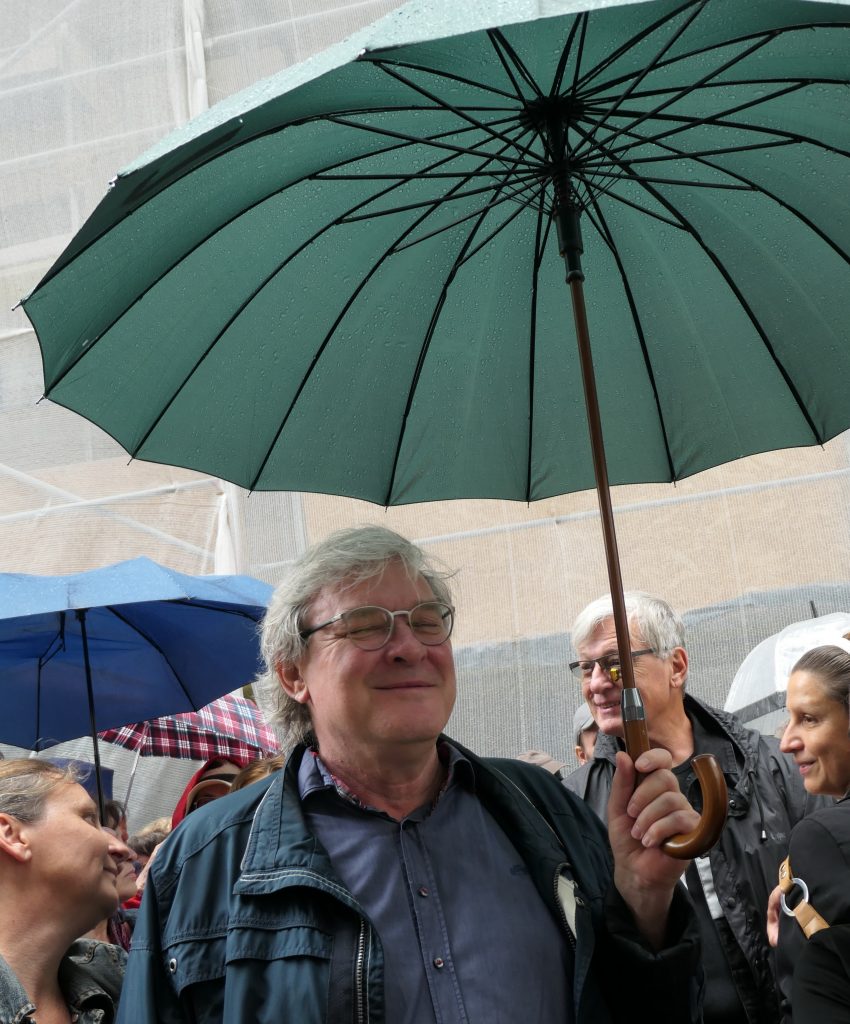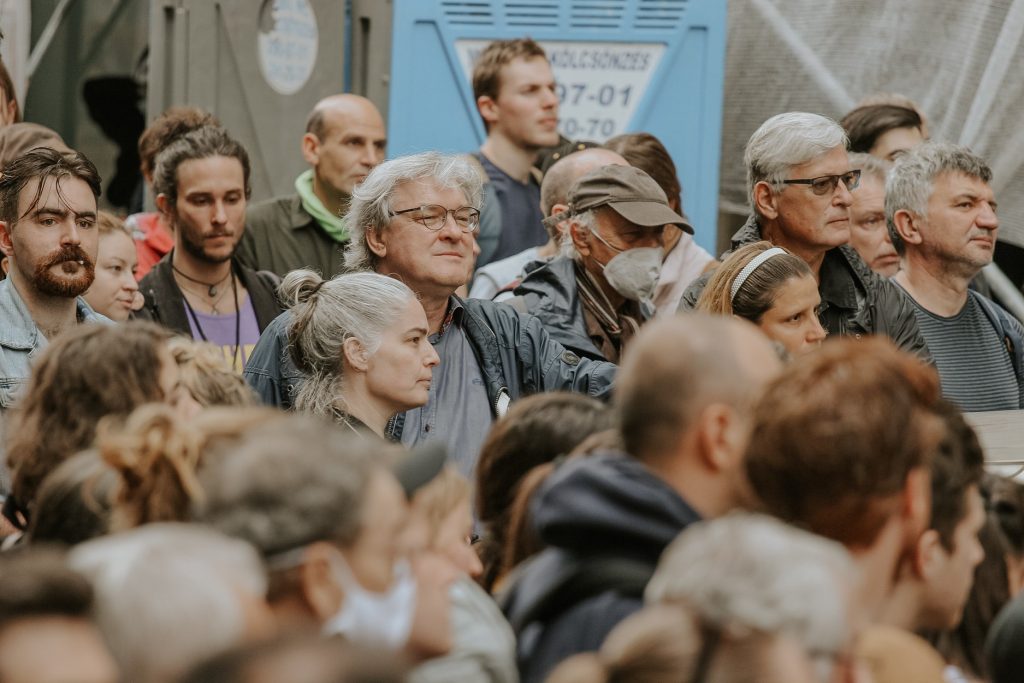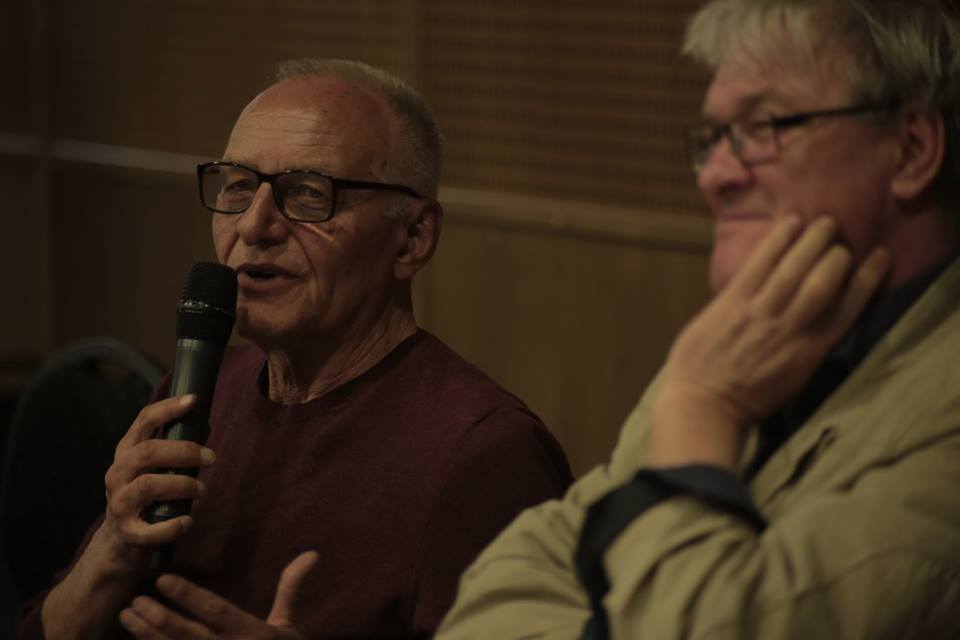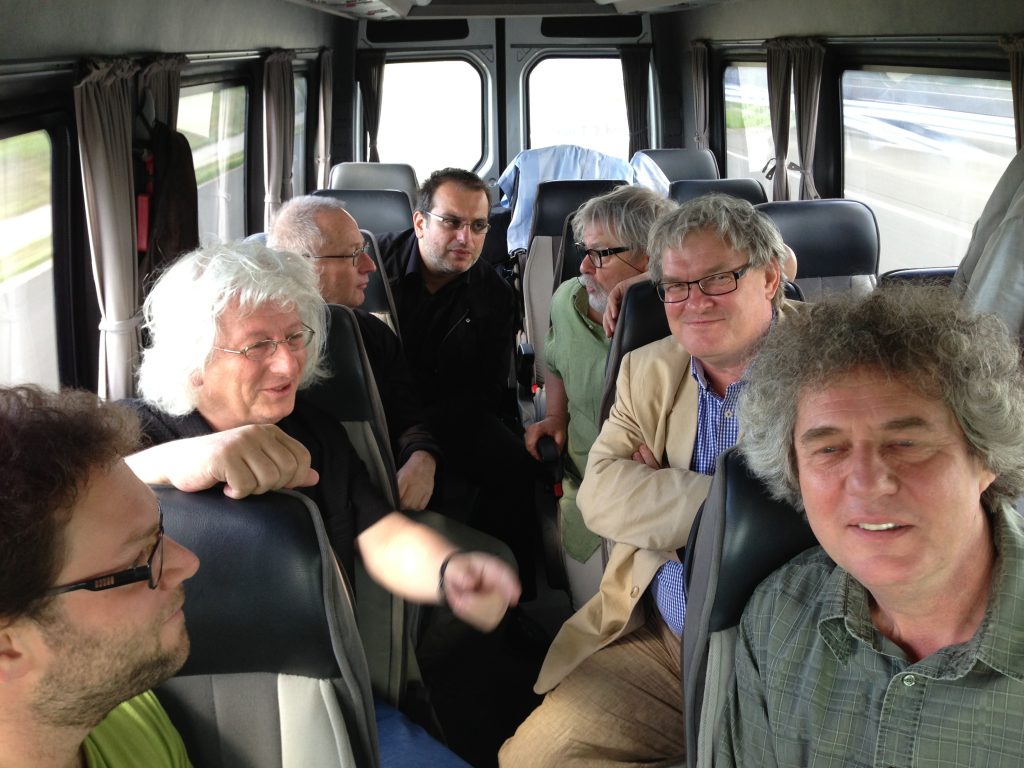Pál Závada: I don’t give the Hungarian government more than a year.
He doesn’t believe that showy street protests and media spectacle are the right way to nurture the culture of resistance. He hopes instead that individual families will change their view of the Hungarian government. That is one of the reasons why the renowned Hungarian writer PÁL ZÁVADA has joined a group of people who distribute newspaper samizdat in the country, including Tótkomlós (Slovenský Komlóš), the town of his birth.
“I would be happy if Hungarian artists helped to improve the international image of our country, he tells dunszt.sk. The film Natural Light, based on his novel of the same title, was awarded a Silver Bear at the Berlinale Film Festival.
How do you see the film´s award in the context of the current situation in Hungary?
I wasn’t involved in the making of the film and, suddenly, I learned that it was completed and about to be shown in Berlin. Soon afterwards I was invited to a screening. The screenplay is based on some selected storylines of my novel. And the film is a testament to the filmmakers’ great work, ambition and enthusiasm. The subject is the facing up to the crimes committed in Hungary during World War II. It is wonderful that the film received the award, and I am very proud of the director Dénes Nagy, his team and of the film itself. They deserve full credit and I am glad that they were inspired by my book, even keeping its title. I would be really happy if this fantastic filmmaker and his crew, as well as Bence Fliegauf, the director of another film that won a Silver Bear, could help improve Hungary’s image on the international stage. We could do with that. Sometimes a few words are enough and can make a difference. I have had this experience in Slovenský Komlós/Tótkomlós.
You are part of an initiative that prints samizdat newspapers and distributes them around the country. Who else is involved in this initiative?
It’s a shoestring operation run by a small team. They don’t publish original content but compile relevant information from reliable sources and put it out in a condensed form, typeset on A4 paper so that it can be easily printed, folded in half and put through a letter-box or distributed by email. It is done on a weekly basis, by volunteers and their network of activists, who distribute the paper in their locality. I suggested that they identify a contact person in every town, a local who knows how to reach those who may be interested in receiving the information.
Does it have to be done in printed form?
We have gone back to samizdat because the Hungarian media are in a really dismal state. This is an important way of alerting people to relevant information, since the Fidesz voter stronghold is in the small villages, the countryside, whose population is misinformed and most exposed to government propaganda. The people are being duped into panicking about what might happen should Fidesz fail to win the next election. And since the government has bought up the entire regional press, the same news and lies are being printed virtually everywhere. We lack decent public television, radio or newspapers, so we should have at least independent samizdat. The kind produced by the democratic opposition under the Kádár regime.

Do you think it is having an impact?
Sometimes all it takes is a few words of explanation. They can carry great weight. This is my experience in my native town Tótkomlós.
Can you tell us more about this experience?
I was able to influence the general atmosphere there. Until the 2019 election, the local authorities were composed exclusively of members of Fidesz, but we managed to turn this around. Now there is an opposition mayor and opposition councillors are in the majority. We very much hope that in 2022 opposition politicians will contest the parliamentary election on a joint list. Their solidarity is key to victory.

What changed the minds of the people in your town?
Ironically, it was the local Fidesz businessmen themselves. They are extremely brazen and have no scruples. They stole without batting an eyelid. For example, they could have easily restored a children’s creche in a lovely old building but instead they built a new one which cost an exorbitant amount of money, they took out the most expensive, extravagant loans and lined their own pockets. We are talking about hundreds of millions of forints (300 HUF = 1 USD), of which they pilfered at least two-thirds. There were other investments of this kinds; pavements, for example, which haven’t been repaired despite all their promises. The old local council treated the local people terribly, continually fobbing them off. So the people started to come together, timidly at first. They had no money, but they joined forces and I supported them.
The samizdat you have mentioned has recently appealed to readers not to stop listening to the radio station Klubrádió; you even made a short video clip about it. What has happened?
The station faces total annihilation. In fact, for many people it has already ceased to exist after it was deprived of its nationwide broadcast frequency rights and could be heard only in Budapest. Now the government has curtailed it even more drastically, and it is available only online. Except that not everyone in the country has internet and even those who do don’t necessarily use it to listen to radio. In addition, people in the countryside traditionally listen to Kossuth Rádió, which pushes the government line and cannot be compared to Klubrádio in terms of partisanship. That is, if they listen to radio at all.
Why did Klubrádió lose its frequency?
It is a radio station that voices critical opinion. The government has been trying to silence it for more than ten years under various pretexts, citing such breaches of formal regulations as missing signatures from the back pages of their applications. The latest pretext was that the station missed the deadline for reporting to the Media Council on the daily figures for broadcast music and text. At the same time the government applied for the same frequency under the guise of an incompetent company, so that it could later appeal to the formal rejection, causing further delays. And in the meantime, Klubrádió’s licence for the frequency had expired and it was switched off straight away. Now they have to wait again for the Media Council to discuss their application and for whatever new pretext they might use to refuse them the frequency.
How many listeners did it have?
It had the greatest number of listeners of any radio station. Its importance is enormous, as it is the only reliable radio broadcast in Hungarian, the only station that still provides genuine, accurate information that can be distinguished from mere opinions, and brings undistorted reports from Hungary and abroad. It is open to discussion and does not push government propaganda. Actually, I wouldn’t call it an opposition station, because that’s not what it is, it simply plays the role of a public broadcaster that is now missing in Hungary, even though there are other Hungarian “royal” radio and TV stations that purport to provide a public service. Quite apart from the government monopoly of print media. That is why I believe Klubrádió will get its frequency back. I don’t give this government more than a year.

The resistance of Hungary’s art scene culminated in September 2020 following the government’s hostile takeover of the University of Theatre and Film Arts in Budapest (SzFE). It continues to this day. What has happened there?
SzFE was a state-run university but all of a sudden, without any consultation, it was decided that it would be handed over to a foundation whose majority owner is an oil refinery, which meant that businessmen representing this sector have ended up on the foundation’s board. The leadership of the university was handed over to the theatre director Attila Vidnyánszky, one of the most loyal Fidesz lackeys, who had previously taken over and destroyed teaching at the university of Kaposvár, totally wrecked the National Theatre in Budapest, taking it over after Róber Alföldi was fired. He has also founded Teátrum, a theatre association that brings together failing theatres politically bound to, and lavishly funded by, Fidesz. And generally, he has taken over every key position in the theatre world involved with decisions on funding.
How did he justify the changes at SzFE?
He said it wasn’t sufficiently „nationally oriented” and that the teaching did not sufficiently represent Christian values. He has appointed new course leaders, people lacking in talent and credibility, bootlicking careerists. He has curtailed the autonomous powers of an institution of higher education and, finally, using the pandemic as a pretext, expelled independent students who stood up against the changes. He has handed over the entire university, along with the school’s theatre and halls of residence, to the Reformed Church. I could go on.
What is happening to the students and teachers now?
The students are still on strike and the teaching has moved online. They keep working on their assignments under the guidance of their original tutors, who make sure that the students keep up their required attendance at lectures and seminars so that they are eligible for exams. Incidentally, the teaching never stopped even during the long weeks when the university building in Vass utca was blockaded. Some students took turns guarding the premises while others sat at home in front of their computers, studying. So the strike continued on the outside, but on the inside work has never stopped.
The students have not accepted the new school leadership, but meanwhile several of the original teachers, well-known artists, have resigned and left. Some have stayed, some new ones came. How does one make some kind of sense of all this?
The students have not accepted the new teachers but haven’t stopped working on their assignments. The new teachers don’t teach. They are waiting for the new student intake, if there are any new students there, that is. The question is whether anyone will apply to study under them. This is a real stalemate, with the original teachers and students pretending that it’s business as usual and the university is still functioning, but meanwhile they have lost their premises. The pandemic has introduced online tuition, which has, paradoxically, made things easier. Except that they also need to rehearse, to create. Quite recently the Budapest’s VII district council has offered them a one-storey building. But this is not an ideal solution because they have to share the building with a children’s art school. So the search for suitable premises continues.
Will the new university leadership recognize students’ assessments and grades?
They refuse to recognize them and have deleted the assessment system and the students’ work from the SzFE’s computers. Teaching is taking place in three different venues across town and they declared the past term null and void. Fortunately, everything has been documented and recorded, so continuity can be maintained in future and none of the results have been lost. But the damage is enormous.
How does one go on in this kind of situation?
There is still strong resistance to the new leadership, which lacks all credibility. No one applying for a teaching job there, and prepared to build on the wreckage of the original university, can be regarded as credible. The greatest benefit of this whole affair is that the school’s students can serve as an example to others. We can all learn from them.
But the fact is that neither the protest nor international support have made any difference so far, even though universities in Prague, Bratislava, Berlin or Vienna have expressed their support for SzFE. Does that not make people feel disillusioned?
I don’t agree with you on this point. It would be disillusioning if in this situation the students and the former leadership of the university agreed a compromise with the new teaching staff. Because that would mean that they had consented to having their autonomy and freedom of choice taken away and condoned the violent way this was done.
Is compromise not possible?
It takes two to compromise. In theory, the students might be willing to compromise provided the authorities came up with acceptable teachers. Then they could say, all right, this director has achieved a lot, he or she has a great reputation, I will take their course seeing as my old teachers have been trampled underfoot. Except that the authorities are unable to offer any teachers with this kind of credibility. In my view, it is impossible to negotiate with them. Of course, this kind of situation carries risks that have an impact on the students, because it could happen that they would not get their degree, or would have to study for a year longer. But the students have been willing to accept this risk because they feel it is more important to be taught by respected and credible people than to have a degree, a piece of paper. They can get that sooner or later, maybe from Bratislava or some other university willing to show solidarity. The important thing is to make sure that these students don’t suffer in administrative terms and can get an accredited degree. Another thing is to ensure they can study elsewhere given that the situation is as it is.
The Hungarian government seems to be behaving in an increasingly autocratic way.
It is quite obvious how it operates; we all know that it completely disregards the discontent of the population. But the students won’t give up. After all, what’s been offered to them is total nonsense. However, compared to other, slow and creeping manoeuvres in the country, the situation at this university is specific in that it arose abruptly, from one day to the next. The university has been taken over and destroyed, the government has dismissed wholesale every suggestion by the university’s senate and appointed exclusively its own people. The students and their teachers simply had to respond to that. They know how to resist in a way that carries a weight. They are good at voicing their opinions, writing speeches, speaking in public, they know how to defend their interests and to continue resistance. This is not just due to their theatre and film skills but also because they know how people should act as citizens.

What is the impact of the pandemic in Hungary in this context?
Unfortunately, in this context, too, political considerations trump social ones. And other than Orbán’s policy, there is no neutral support the state can provide. Theatre people or musicians who have lost all opportunities to work have no way of getting any aid unless they are willing to support the government. Even though the pandemic has affected our lives regardless of our political orientation.
What are the mechanisms of support for creative artists?
The way I see it, musicians have been hit the hardest because most of them are freelancers and have lost any opportunity to perform. For example, Szilárd Demeter, director of the Petőfi Literary Museum and the man in charge of the distribution of all financial support in the arts, has come up with something he calls “concerts in a depot”. These are supposed to attract bands and musicians who wish to receive state support. That means that they give a concert, which is recorded and broadcast by the media which, of course, have long been bought up by the government. But this support is very limited, plus you have to consider very carefully whether you want to apply for it. Because even when you apply, you will be assessed by a “politically correct” committee which will decide whether you will get the support or not.
Can this be harmful to artists?
Let me give you an example. A certain band unexpectedly received this kind of aid. They gave a concert, with a man in a clown outfit acting as M.C. He made a few ironic remarks about the government. Everything was filmed, censored and in the end the M.C. was attacked and brutally assaulted by extreme right-wing thugs in the street. You can’t call this support. And even though the artists don’t come to any harm – because most of the concerts are harmless – it is still a very paltry kind of support, dependent on the powers-that-be. We don’t want to be put in a situation where we have to be fed by the government’s hands and obliged to kiss them for it. People should receive support because they are entitled to it. Hungary is the only country in Europe without an institutional policy aimed at helping people who have lost their income because of the pandemic.
How does the grant system work?
Grants are also closely linked to politics and writers can get them only if they meet some very denigrating conditions. Lists of applicants are approved by officially appointed committees without the knowledge of the authors, meaning that respected writers are treated in the same way as total dilettantes. It is a very tricky affair: you have to consider what the government will ask from you in return, what you will have to put your signature to, what kind of demands you will be expected to meet. Once you accept a grant, you cannot refuse the strings that are attached to it. You can’t say, sorry, I’m not taking part in this event because the person who is appearing alongside me is an extreme right-winger, an Arrow Cross supporter, and I’m not prepared to share the stage with him. They will destroy you.
So how do you manage to keep going?
I sit at home and focus on writing a novel, but things have changed for me because they have changed for many of my usual collaborators. I would love to write a stage play and see it produced. But the options have narrowed substantially. First, you have all the Covid-related restrictions, but apart from that , even if there were no pandemic, there are fewer and fewer theatres left that I can work with. In Budapest it is only the Katona, Radnóti and Örkény theatres. Most of the regional theatres were swallowed up by Fidesz politics years ago. They produce entertainment on demand: this is the case in Kaposvár, Kecskemét, Békéscsaba, Szolnok, Tatabánya, Győr. Only Miskolc is still holding up. And in Székesfehérvár they have a kind of Fidesz with a human face. The theatre director has invited four authors, myself included, to write a sequel to Madách’s classic, The Tragedy of Man. We started rehearsing but then the pandemic hit. Over the past two years this was the only chance for me as an author of live theatre since Market Day four years ago at the Radnóti Theatre. The remaining theatres are either closed or I refuse to work with them. This has affected me profoundly.
And what about the monies Hungary receives from the European Union?
Just take a look at what Orbán’s cronies have spent it on. Things such as renovating their hotels or a world hunting exhibition. We are talking of billions of forints. The opposition has raised this with them openly in parliament, but the government has just ignored it. It is an absolute outrage.
Are we witnessing the downfall of democracy?
I have seen this several times before. The masses are being deceived, manipulated, blackmailed, robbed. Though I am sceptical, I do see a way out – through getting truthful information to people. I firmly believe that people will eventually realize that the real cause of the miserable situation in this country is Fidesz and that they cannot expect that party to solve the problems.
What can Hungarian citizens achieve by strikes and street protests?
The only genuine, peaceful and proper protest I have seen in the past few years was the one in defence of the SzFE university. Otherwise, it is mostly the extreme right that is notorious for their protests, for behaving like louts and setting cars alight. That is why I would prefer it if discontent was not expressed by this kind of protest. Just remember that there were no street protests before the local elections of 2019 and yet peaceful protest did happen: Fidesz lost its majority in several larger cities. For me this means that we need to nourish the culture of resistance, but without expecting too much of mass protests. And that an increasing number of families will finally change their attitudes, people will go to the ballot box and the government and its modus operandi will change without great drama. I firmly believe this.
Pál Závada (1954)
* Born in Tótkomlós in Hungary (Slovenský Komlóš), as a member of the town’s ethnic Slovak community.
* Studied sociology, from 1982 to 1993 worked at the Institute of Sociology of the Hungarian Academy of Sciences, later as an editor with the journals Hiány and Holmi.
* In 1986 he published his first book, the sociographic novel Kulákprés (Kulakpress), in 1996 a collection of stories Mielőtt elsötétül (Before Darkness).
* His novel Jadviga párnája (Jadviga’s Pillow), published in 1997, is one of most successful works of contemporary fiction in Hungary; it has spawned a theatre and film adaptation. * His novel Idegen testünk (Our Alien Bodies), set in a photographer’s studio in Budapest in 1940, tells the story of characters traumatised by the events of the twentieth century.
* In his novel Természetes fény (Natural Light), published in 2014, he revisits his place of birth and depicts the life of its inhabitants during World War II and its aftermath. * His most recent works are the novels Egy piaci nap (Market Day) and Hajó a ködben (Adrift in the Fog).
* He is the author of several plays and the recipient of numerous literary prizes.
* He lives in Budapest and has two sons, for whom he has translated Slovak fairy-tales into Hungarian.
* His son Péter Závada is a poet, lyricist and translator.
Translated by Julia Sherwood
Ha tetszik, amit csinálunk, kérünk, szállj be a finanszírozásunkba, akár csak havi pár euróval!
